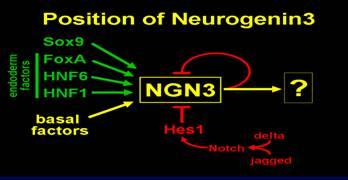During development, as cells differentiate and mature, the set of genes operating in their nuclei progressively changes. These changes in gene expression are controlled by the transcription factors, proteins that bind to DNA and control the activity of individual genes. Cellular differentiation, therefore, can be viewed, at least in part, as a series of changes in gene expression, controlled by a cascade of transcription factors. If we can understand how this process works, we can control the production of beta-cells. We have identified a number of transcription factors involved in islet development, members of the basic helix-loop-helix (bHLH), homeodomain and other transcription factor families. These factors form a complex hierarchy that we are beginning to outline and to understand. Ongoing work on islet transcription factors includes genetic studies of their roles in islet development, in vitro studies of their function, and studies of how these regulators are themselves regulated.
